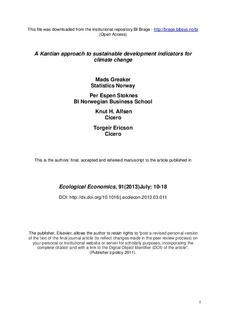| dc.contributor.author | Greaker, Mads | |
| dc.contributor.author | Stoknes, Per Espen | |
| dc.contributor.author | Alfsen, Knut H. | |
| dc.contributor.author | Ericson, Torgeir | |
| dc.date.accessioned | 2013-08-22T11:00:24Z | |
| dc.date.available | 2013-08-22T11:00:24Z | |
| dc.date.issued | 2013 | |
| dc.identifier.issn | 1873-6106 | |
| dc.identifier.uri | http://hdl.handle.net/11250/93932 | |
| dc.description | This is the authors’ final, accepted and refereed manuscript to the article | no_NO |
| dc.description.abstract | Agenda 21 required countries to develop and regularly update a national set of indicators for sustainable development. Several countries now have such sets also including separate indicators for climate change. Some of these indicators typically report global concentration of green house gases in the atmosphere or time series for global temperatures. While such indicators may give the public information about the state of the global climate, they do not provide a benchmark which makes it possible for the public to evaluate the climate policy of their government.
With Kantian ethics as our point of departure, we propose a benchmark for national climate policy. The benchmark is that each nation state should act as if a global treaty on climate change were in place. This would require each nation state to carry out all green house gas mitigation projects below a certain cost. Furthermore, it would require each nation to keep their national green house gas emissions including acquisitions of emission permits from other countries within a certain limit. Both measures are relatively easy to track and can thus serve as indicators. | no_NO |
| dc.language.iso | eng | no_NO |
| dc.publisher | Elsevier | no_NO |
| dc.subject | Sustainable development indicators | no_NO |
| dc.subject | Climate policy | no_NO |
| dc.subject | Climate agreements | no_NO |
| dc.title | A Kantian approach to sustainable development indicators for climate change | no_NO |
| dc.type | Journal article | no_NO |
| dc.type | Peer reviewed | no_NO |
| dc.source.pagenumber | 10-18 | no_NO |
| dc.source.volume | 91 | no_NO |
| dc.source.journal | Ecological Economics | no_NO |
| dc.source.issue | July | no_NO |
| dc.identifier.doi | http://dx.doi.org/10.1016/j.ecolecon.2013.03.011 | |
